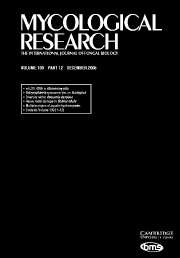Crossref Citations
This article has been cited by the following publications. This list is generated based on data provided by
Crossref.
Schulz, Barbara
Boyle, Christine
Draeger, Siegfried
Römmert, Anne-Katrin
and
Krohn, Karsten
2002.
Endophytic fungi: a source of novel biologically active secondary metabolites
.
Mycological Research,
Vol. 106,
Issue. 9,
p.
996.
2002.
Fungi from Coral Reefs.
Mycological Research,
Vol. 106,
Issue. 4,
p.
387.
Osterhage, Claudia
König, Gabriele M.
Höller, Ulrich
and
Wright, Anthony D.
2002.
Rare Sesquiterpenes from the Algicolous Fungus Drechslera dematioidea.
Journal of Natural Products,
Vol. 65,
Issue. 3,
p.
306.
Garo, Eliane
Starks, Courtney M.
Jensen, Paul R.
Fenical, William
Lobkovsky, Emil
and
Clardy, Jon
2003.
Trichodermamides A and B, Cytotoxic Modified Dipeptides from the Marine-Derived Fungus Trichoderma virens.
Journal of Natural Products,
Vol. 66,
Issue. 3,
p.
423.
Kohlmeyer, Jan
and
Volkmann-Kohlmeyer, Brigitte
2003.
Fungi from Coral Reefs: A Commentary.
Mycological Research,
Vol. 107,
Issue. 4,
p.
386.
Lin, Wenhan
Brauers, Gernot
Ebel, Rainer
Wray, Victor
Berg, Albrecht
Sudarsono
and
Proksch, Peter
2003.
Novel Chromone Derivatives from the Fungus Aspergillus versicolor Isolated from the Marine Sponge Xestospongia exigua.
Journal of Natural Products,
Vol. 66,
Issue. 1,
p.
57.
Krohn, Karsten
SteingrÖver, Klaus
Aust, Hans-JÜrgen
Draeger, Siegfried
and
Schulz, Barbara
2003.
Biologically Active Metabolites from Fungi, 17. 8-α-Acetoxyverrol, A new Member of the Trichothecene Sesquiterpenes.
Natural Product Research,
Vol. 17,
Issue. 1,
p.
67.
Zuccaro, Alga
Schulz, Barbara
and
Mitchell, Julian I.
2003.
Molecular detection of ascomycetes associated with Fucus serratus.
Mycological Research,
Vol. 107,
Issue. 12,
p.
1451.
Abdel-Lateff, Ahmed
Klemke, Christine
König, Gabriele M.
and
Wright, Anthony D.
2003.
Two New Xanthone Derivatives from the Algicolous Marine Fungus Wardomyces anomalus.
Journal of Natural Products,
Vol. 66,
Issue. 5,
p.
706.
Crews, Phillip
Gerwick, William
Schmitz, Francis
France, Dennis
Bair, Kenneth
Wright, Amy
and
Hallock, Yali
2003.
Molecular Approaches to Discover Marine Natural Product Anticancer Leads – An Update from a Drug Discovery Group Collaboration.
Pharmaceutical Biology,
Vol. 41,
Issue. sup1,
p.
39.
Amagata, Taro
Rath, Christopher
Rigot, Jérôme F.
Tarlov, Nick
Tenney, Karen
Valeriote, Frederick A.
and
Crews, Phillip
2003.
Structures and Cytotoxic Properties of Trichoverroids and Their Macrolide Analogues Produced by Saltwater Culture of Myrothecium verrucaria.
Journal of Medicinal Chemistry,
Vol. 46,
Issue. 20,
p.
4342.
Berlinck, Roberto G. S.
Hajdu, Eduardo
da Rocha, Rosana M.
de Oliveira, Jaine H. H. L.
Hernández, Isara L. C.
Seleghim, Mirna H. R.
Granato, Ana Claudia
de Almeida, Érika V. R.
Nuñez, Cecília V.
Muricy, Guilherme
Peixinho, Solange
Pessoa, Claudia
Moraes, Manoel O.
Cavalcanti, Bruno C.
Nascimento, Gislene G. F.
Thiemann, Otavio
Silva, Marcio
Souza, Ana O.
Silva, Celio L.
and
Minarini, Paulo R. R.
2004.
Challenges and Rewards of Research in Marine Natural Products Chemistry in Brazil.
Journal of Natural Products,
Vol. 67,
Issue. 3,
p.
510.
Zheng, Li
Chen, Haimin
Han, Xiaotian
Lin, Wei
and
Yan, Xiaojun
2005.
Antimicrobial screening and active compound isolation from marine bacterium NJ6-3-1 associated with the sponge Hymeniacidon perleve.
World Journal of Microbiology and Biotechnology,
Vol. 21,
Issue. 2,
p.
201.
Zheng, Li
Yan, Xiaojun
Xu, Jilin
Chen, Haimin
and
Lin, Wei
2005.
Hymeniacidon perleve associated bioactive bacterium Pseudomonas sp. NJ6-3-1.
Applied Biochemistry and Microbiology,
Vol. 41,
Issue. 1,
p.
29.
Larsen, Thomas O.
Smedsgaard, Jørn
Nielsen, Kristian F.
Hansen, Michael E.
and
Frisvad, Jens C.
2005.
Phenotypic taxonomy and metabolite profiling in microbial drug discovery.
Natural Product Reports,
Vol. 22,
Issue. 6,
p.
672.
Gesner, Shiri
Cohen, Naama
Ilan, Micha
Yarden, Oded
and
Carmeli, Shmuel
2005.
Pandangolide 1a, a Metabolite of the Sponge-Associated Fungus Cladosporium sp., and the Absolute Stereochemistry of Pandangolide 1 and iso-Cladospolide B.
Journal of Natural Products,
Vol. 68,
Issue. 9,
p.
1350.
Zheng, Li
Yan, Xiaojun
Han, Xiaotian
Chen, Haimin
Lin, Wei
Lee, Frank S. C.
and
Wang, Xiaoru
2006.
Identification of norharman as the cytotoxic compound produced by the sponge (Hymeniacidon perleve)‐associated marine bacterium Pseudoalteromonas piscicida and its apoptotic effect on cancer cells.
Biotechnology and Applied Biochemistry,
Vol. 44,
Issue. 3,
p.
135.
Rot, Chagai
Goldfarb, Itay
Ilan, Micha
and
Huchon, Dorothée
2006.
Putative cross-kingdom horizontal gene transfer in sponge (Porifera) mitochondria.
BMC Evolutionary Biology,
Vol. 6,
Issue. 1,
dela Cruz, Thomas Edison
Wagner, Stefan
and
Schulz, Barbara
2006.
Physiological responses of marine Dendryphiella species from different geographical locations.
Mycological Progress,
Vol. 5,
Issue. 2,
p.
108.
Wang, Guangyi
2006.
Diversity and biotechnological potential of the sponge-associated microbial consortia.
Journal of Industrial Microbiology & Biotechnology,
Vol. 33,
Issue. 7,
p.
545.


